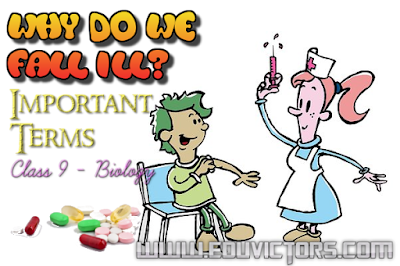Why do we fall ill? - Important Definitions
Health:
A state of being well enough to function well physically, mentally and socially.
WHO defined health as ‘a state of complete physical, mental and social well-being and not merely the absence of disease or infirmity’"
Disease:
Lack of feeling of ease or distress due to impairment of health or a condition of abnormal functioning or structural disorder.
Hygiene :
Condition and practices that help to maintain health and prevent the spread of diseases.
Symptoms:
A series of events occurring that often point to a disease or condition.
Signs:
Objective evidence of disease as identified by physicians or doctors.
Acute disease:
Disease lasting for a short period of time.
Chronic disease:
Disease lasting for a long time, even as much as a lifetime.
Vectors:
The intermediate animals causing the spread of infecting agents from a sick person to another potential host.
Host:
An organism that is infected with or is fed upon by a parasitic or pathogenic organism.
Pathogen:
Any disease-producing agent such as a virus or bacteria or other micro-organisms.
Infectious disease:
A disease where pathogenic microbes are the immediate causes.
Non-infectious diseases:
Diseases where internal causes result in the distressed disorder.
Communicable disease:
A disease capable of being transmitted from an infected person to a healthy person.
The immediate cause of disease:
The cause which immediately kindles a disease into action, when there is a predisposition towards it or the first cause or factors which are directly responsible for a particular disease.
Contributory cause of disease:
A cause or condition whose presence makes it more probable that a particular disorder will occur, but that cause is neither necessary nor sufficient for the occurrence of the disease.
Epidemic:
The rapid spread of infectious disease to a large number of people in a given population within a short period of time.
Antibiotics:
A substance produced by bacteria or fungi that destroys or prevents the growth of infectious or disease causing organisms.
Inflammation:
The recruitment process by an active immune system of recruiting many cells to the affected tissue to kill off the disease-causing microbes.
Vaccine:
A preparation of a weakened or killed pathogen or of a portion of the pathogen’s structure that upon administration stimulates the immune system to fight against the pathogen, but is incapable of causing severe infection.
Immune System:
It is a body's defence system comprising many biological structures and processes within an organism that protects against disease.
Immunisation:
The process of inducing immunity by administering a vaccine to allow the immune system to prevent infection or illness when it subsequently encounters the infectious agent.
Allergy:
It is a hypersensitivity to certain substances, is an extreme reaction of the body’s immune system.
Antigen:
When a pathogen invades our body, it releases toxins into the bloodstream or in tissues. This toxin or foreign protein entering our body is called antigen.
Antibodies:
The proteins produced by our immunity system (lymphocytes, WBCs etc.) to neutralise or detoxify antigens are called antibodies.
☛See also:
Ch 13 - Why do we fall Ill? (Q & A)
Ch 13 - Why do we Fall ill? (MCQs) or Online Quiz
Ch 13 - Why do we Fall ill? (Important Differences)
Ch 13 - Why do we fall ill? (Infographic on Health)
Ch 13 - Why do we fall ill? (Important Terms To Remember - Quiz)
HIV/AIDS (A Brief Introduction)
Ch 13: Why do we fall ill? (Important Definitions)


No comments:
Post a Comment
We love to hear your thoughts about this post!
Note: only a member of this blog may post a comment.